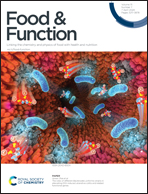Dietary serine intake is associated with cognitive function among US adults
Abstract
Aims: Diet can modify the risk of cognitive decline. However, research on the relationship between dietary intake of serine and cognitive decline remains limited and this study aims to reveal the relationship between them. Methods: Data from the National Health and Nutrition Examination Survey (NHANES) 1988–1994 (n = 1837) were used to explore the relationship between dietary intakes of serine and cognitive function through quantile multiple linear analysis and restricted cubic splines (RCS) regression. We also investigated 9 food groups for serine intake according to the USDA food code to determine which food sources of serine are beneficial for cognitive function. Results: The top three serine intakes were attributed to meat/poultry/fish, grain products, and milk or milk products. Multivariable linear regression analysis showed that a significant negative linear trend was observed between serine intake and SDLT. RCS results showed a non-linear relationship between serine intake and SDLT or SDST. Among the 9 food group intakes, milk or milk products sourced serine intake was good for memory ability. Conclusion: serine, particularly serine from milk or milk products, has a beneficial impact on memory ability in adults.



 Please wait while we load your content...
Please wait while we load your content...